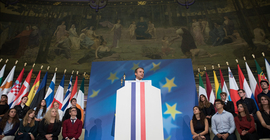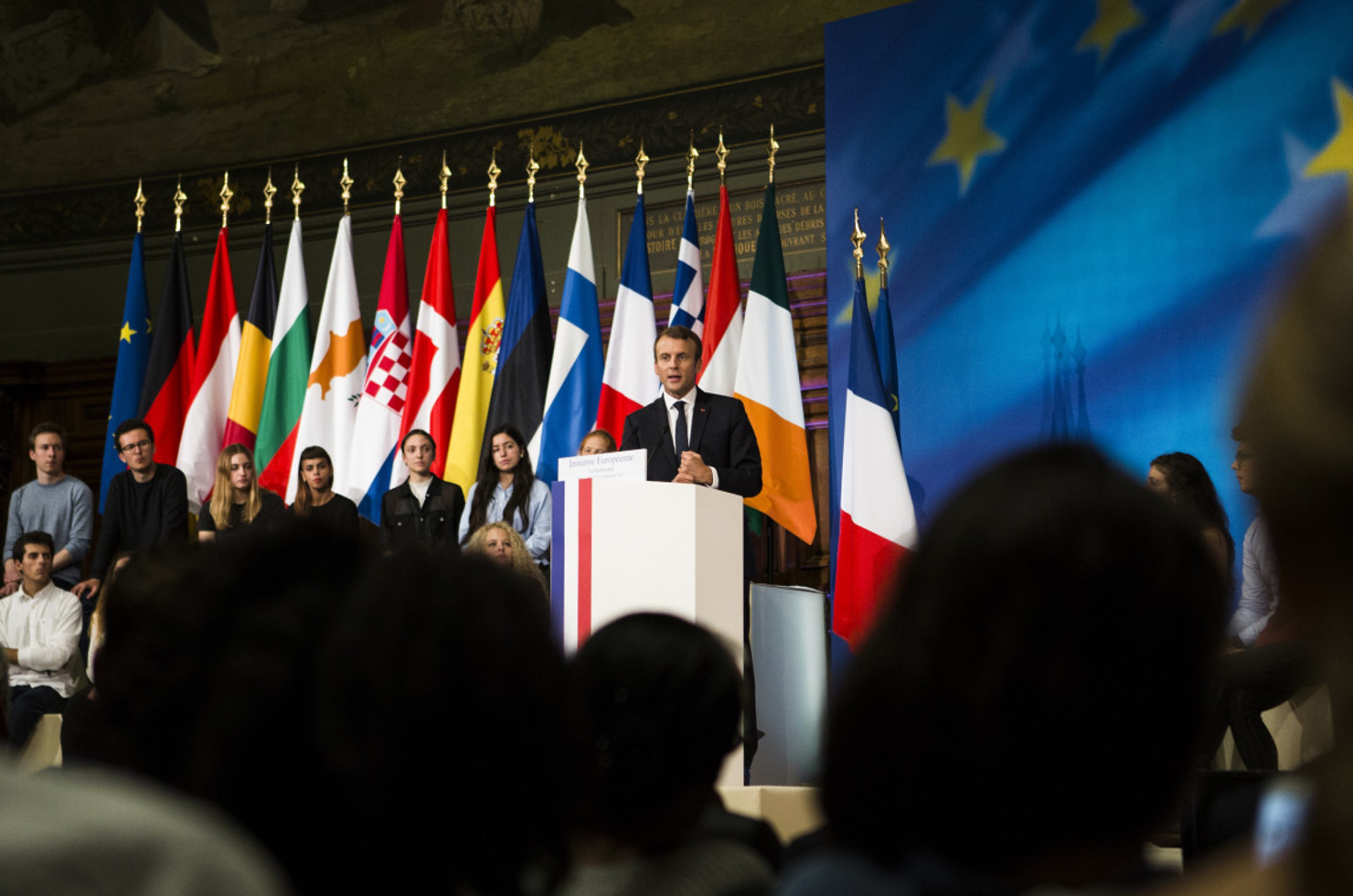“It is up to us, to you, to map out the route which ensures our future, the one I wish to talk to you about today. The route of rebuilding a sovereign, united and democratic Europe. Let us together have the audacity to create this route.”
Sorbonne Speech – 26 September 2017.
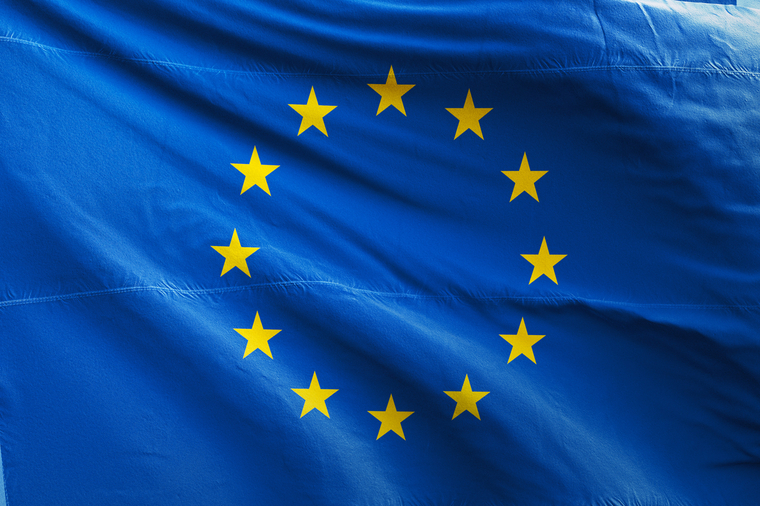
A Europe that protects
Defence Europe
“In the area of defence, our aim needs to be ensuring Europe’s autonomous operating capabilities, in complement to NATO.”
Since 2017:
- Creation of a European Defence Fund to encourage EU Member States to research and development projects in cooperation in the field of defence technologies. To date, 101 projects have been financed by the European Defence Fund, which has a budget of nearly €8 billion for 2021-2027.
- Creation of a European Peace Facility (with a budget of €17 billion for 2021-2027), which has been massively mobilized for Ukraine (€11.5 billion dedicated to Ukraine) to fund the delivery of military equipment that is crucial for the Ukrainian armed forces.
- Launch of an extensive mission to provide training to the Ukrainian armed forces, EUMAM Ukraine.
- Creation of the European Intervention Initiative, in which 13 Member States participate, to create a common strategic culture, and in the Takuba Task Force to fight terrorist groups in the Sahel region.
- Translation in concrete terms of the shared ambition showcased in Versailles in March 2022 to strengthen our defence industrial base for more strategic autonomy, with the drafting of a European defence strategy in response to Russian aggression through original arms procurement initiatives by Member States (EDIRPA) and for more European military production capacities (production of munitions and missiles, ASAP). Work is ongoing to put in place long-term instruments within a European Defence Industry Programme (EDIP).
- Adoption of the Strategic Compass in 2022, establishing our common doctrine to act, invest, cooperate and protect, and a tangible road map until 2030, that has already started to be implemented.
- Adoption of European Peace Facility assistance measures for 22 partners, including Armenia, Georgia and Moldova, as well as in Africa with the Security and Defence Initiative in support of West African Countries of the Gulf of Guinea.
- Building the EU’s capacity to protect challenged strategic spaces, in particular to fight hybrid threats and information manipulation, as well as the adoption of a space strategy for security and defence.
- Regular meetings of the European Political Community (EPC), which promotes a peace and stability agenda at the level of the European continent fostering discussion on our common challenges: energy, connections, infrastructures, security, human mobility and regional tensions. Three summits have already taken place in Prague, Chisinau and Grenada. Two summits will be held in the United Kingdom and Hungary in 2024.
Counter-terrorism
“We need to step up the work underway to combat the financing of terrorism and terrorist propaganda online. We need to enhance our cyber security and create a common area of security and justice.”
Since 2017:
- Reform of the legal framework regarding the fight against money laundering and terrorist financing.
- New European legislation makes it compulsory to withdraw any terrorist content within an hour from the time it is reported.
- Creation of the Intelligence College in Europe, which brings together 66 intelligence services from 30 European countries, to develop a common intelligence culture.
European Civil Protection Pool
“I want us to create a European Civil Protection Force, pooling our resources for rescue and intervention, thus enabling us to respond to disasters.”
- Creation of a European civil protection pool, which has been fully operational since summer 2019. Greece used it in 2021 to help fight forest fires and Croatia in 2020 to help cope with the aftermath of the December 2020 earthquake. France used this mechanism to help fight forest fires in summer 2022.
- Creation of a European capacity to finance and procure equipment, RescEU, to help Member States and the nine participating States to respond to natural disasters and large accidents, by addressing transport and logistical emergencies in particular. The RescEU strategic distribution centre distributed masks, gloves and ventilators during the pandemic.
A Europe that looks towards Africa
“I would like our partnership with Africa to be an aspect of the overhaul of the European project.”
Since 2017:
- Partnerships launched with South Africa and Senegal, with the aim of being replicated with other partners, to progressively decarbonize their energy mixes within the framework of fair energy transitions; and to support the production of plant proteins.
- Rapid and tangible European responses to the impacts of international crises in Africa, including:
- The COVID-19 crisis with the emergency deployment of 65 flights serving as humanitarian air bridges, the majority of them deployed in Africa (12 of 20 beneficiary countries), with a €10-million budget and the delivery of 365 million vaccine doses;
- The impacts of the war in Ukraine with more than €9 billion by 2024 to improve food security in Africa.
- European Union-African Summit on 17 and 18 February 2022 organized under the French Presidency of the Council of the European Union.
- The translation of the Europe-Africa Partnership into tangible projects:
- Prosperity: identification of flagship projects in Africa under the European Global Gateway project, which depends in part on the €29.2 billion in EU solidarity investment earmarked for Africa between 2021 and 2027 and invests in sustainable infrastructure.
- Peace and security: Refreshed CSDP missions in Africa and continued support of the European Peace Facility to the AU (€600 million from 2022 to 2024); budgetary support of €20 million to Rwandan forces active in northern Mozambique.
- Migration and mobility: adoption of extensive projects targeting the two main migration routes in Africa (€1.13 billion for the central Mediterranean region and €909 million for the western Mediterranean and Atlantic region).
- Multilateralism: European mobilization for the African Union’s joining the G20.
- Joint trips of Team Europe ministers to step up Europe-Africa dialogue.
- Signature of the EU-ACP Samoa Agreement between the European Union and 79 African, Caribbean and Pacific countries, signed on 15 November 2023 based on a common foundation and regional protocols to ensure democracy and human rights, sustainable growth and economic development, peace and security, migration and mobility.
A Europe that addresses the migration challenge
“We have only one choice, one alternative: closing in behind our borders or the construction of a common area for border management, asylum and migration. ”
A Europe which protects its borders
Since 2017:
- Adoption of the Pact on Asylum and Migration in 2024, which introduces more effective procedures for external borders (screening with a compulsory non-entry principle and procedures at the border with the largest possible compulsory scope), which strengthen the means of Member States to prevent circumvention of asylum procedures, which introduces a new solidarity mechanism among Member States, which modernizes the Dublin system, and which establishes rules determining which Member State is responsible for reviewing an asylum application.
- Recruitment of 10,000 European border guards by 2027.
- Strengthening the mandate and resources of the European Union Agency for Asylum to drive the convergence of Member States’ asylum systems.
- Reform of the Schengen Code, to secure Europeans’ freedom to travel in European Union territory, while preventing irregular crossings at internal borders.
- More consistent and effective management of our shared borders, with the creation of a Council of Ministers of the Schengen Area, which now convenes regularly.
A Europe moving forward thanks to its partners
“We also need to look further, and I want to say clearly that even the most robust borders and most ambitious security policies will not suffice to curb long-term migration flows. Only stabilization and development in countries of origin will dry them up.”
- Strengthening of long-term cooperation with third countries when it comes to migration, aiming to prevent irregular immigration, facilitate sustainable returns and promote safe legal migration pathways, particularly through comprehensive partnerships including the migration issue with Tunisia, Mauritania and Egypt.
- Strengthening of European agencies, including the European Union Agency for Asylum and Frontex, with the launch of support missions in third countries and the signing of agreements between Frontex and third countries to step up their support and share their expertise with partner countries.
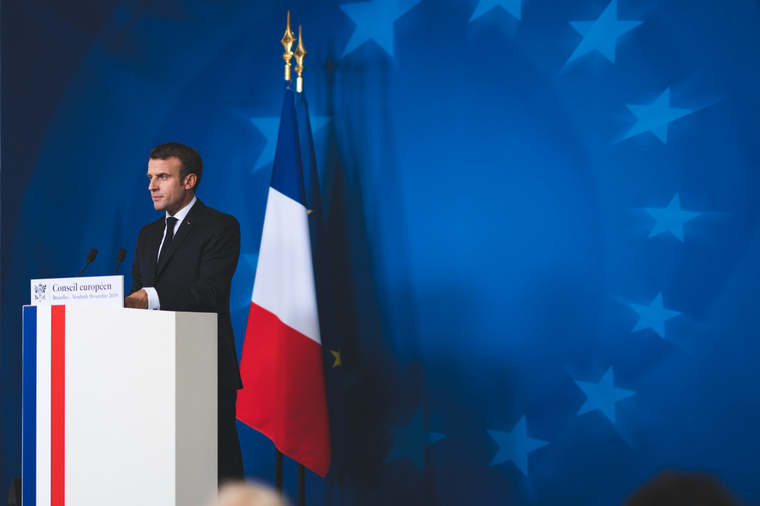
A Europe leading the ecological transition
Protection of the climate and biodiversity
“Today Europe is in a period in between but our choice is simple: do we want to continue producing as we have in the past […] or do we wish to push forward and become leaders of a new production model that will not only be a model for the economy, but also a model for society.”
Since 2017:
- Adoption of the most ambitious goals in the world: carbon neutrality by 2050 and reduction in greenhouse gas emissions by at least 55% by 2030, compared to 1990 levels.
- Transformation of the European Investment Bank into a European Climate Bank, with a green investment plan of €1 trillion for 2021-2030.
- 30% of the European budget for 2021-2027 dedicated to the climate and environmental sustainability.
- Adoption of an EU Carbon Border Adjustment Mechanism for foreign carbon-intensive goods that entered into force on 1 October 2023, in order to subject our competitors, and particularly those with the lowest standards, to the same climate rules as European companies.
- Review of the European carbon market, which scales up its objectives and extends it to new high-emitting sectors (maritime, road transport, public works).
- Creation of a Social Climate Fund, which supports the most vulnerable households and companies when it comes to the green transition.
- Adoption of new rules ending the sale of new petrol and diesel cars on the European market in 2035.
- Adoption of scaled up objectives regarding renewable energies and energy efficiency.
- Adoption of new objectives to reduce harmful emissions from industrial plants and intensive livestock farms in air and water, in order to better protect human health and the environment.
- Agreement to further reduce the use of fluorinated gases and ozone-depleting substances, to better combat global warming.
- Adoption of the Net Zero Industry Act and Critical Raw Materials Act, which will allow for decarbonization and a swift transition to an industry of clean technologies, while making the EU more attractive and securing its strategic supplies.
- Adoption of packaging and ecodesign regulations to promote a market making the consumer accountable and based on a circular economy, upstream and downstream.
A more sovereign Europe in terms of energy
- Ambition pledged at the Versailles Summit in March 2022 and developed in the REPowerEU Plan in May 2022 to end our dependencies, particularly by becoming completely independent from Russian hydrocarbons by 2027.
- Emergency response to Russian aggression:
- Implementation of unprecedented support for households and businesses to help them cope with energy price increases.
- Diversification of energy supply with existing and new partners and joint purchasing of gas at European level.
- Solidarity among Member States, thanks to the European electricity market and interconnections.
- Coordinated reduction of natural gas and electricity consumption.
- Creation of a natural gas storage requirement to create strategic reserves avoiding tensions related to supply and prices.
- Creation of a temporary market correction mechanism in the event of gas price spikes.
- Taxation of excess profits of energy companies.
- Strengthening of European Union energy objectives (energy efficiency and renewable energies) to reduce the EU’s reliance on hydrocarbons and step up the transition under way.
- Reform the electricity market to make electricity prices less volatile and less dependent on fossil energies prices, and to foster investment in nuclear and renewable energy facilities.
- Adoption of common rules for developing the use of hydrogen in Europe, and the creation of a European hydrogen bank.
Food safety and security
“Science must provide information on the dangers but also independently and transparently indicate scientifically proven alternatives.”
Since 2017:
- Following Russia’s war of aggression in Ukraine, creation of “solidarity lanes” in May 2022 making it possible to export 64 million tons of Ukrainian grain, oilseeds and other Ukrainian products (January 2024 figures), in addition to the 33 million tons exported via the Black Sea corridor. Solidarity for Ukraine, seen in the autonomous liberalization measures, should take European farmers’ interests into account: we have enacted measures to adapt this mechanism and to protect our farmers should European markets be destabilized, while maintaining support to Ukraine’s economy.
- Reform of the European Food Safety Authority (EFSA): transparency and independence of scientific studies, governance reform, with a representation of civil society within it.
- Common Agricultural Policy (CAP) reform adopted in June 2021 after four years of negotiations. The reformed CAP wishes to be greener, fairer and more competitive. The French National Strategic Plan (NSP) for 2023-2027 is one of the first NSPs to be validated by the Commission on 31 August 2022.
- Simplifying and easing of CAP environmental conditionality regimes to give our farmers more flexibility in the implementation of rules.
A Europe of economic power and innovation
European Breakthrough Innovation Agency
Europe […] must take the lead in this revolution through radical innovation. Throughout Europe, we must do everything in our power to have these digital champions, to attract talented scientists and entrepreneurs. ”
Since 2017:
- Creation of a European Innovation Council, with €10 billion, to drive the emergence of future European champions.
Economic recovery after the pandemic
- As a consequence of COVID-19, the biggest recovery plan in the history of Europe, NextGeneration EU, to support Member States: more than €800 billion.
- Based on a French-German initiative, the Commission has issued common European debt to fund the ecological and digital transitions of Member States.
- 40% of France’s recovery plan is financed by the European Union.
Reindustrialisation
- Launch of industrial alliances in ten sectors helping to preserve European strategic industrial autonomy, including batteries, raw materials, hydrogen, semi-conductors and launchers.
- Launch of Important Projects of Common European Interest (IPCEI) in the sectors of microelectronics (2018), batteries (2019 and 2021), hydrogen (2022) and connectivity, which mobilized more than €30 billion in government aid and more than €56 billion in private funds. On the 60 French sites in the fields of hydrogen, batteries, microelectronics and connectivity, more than 50% is financed via an IPCEI.
- Conduct by the Commission in 2020 of a first in-depth review of EU strategic dependencies (goods, services, technologies) and a second review in 2022.
- Adoption in March 2022 of the Versailles Declaration, including a list of strategic sectors and tangible objectives to reduce European dependencies. In this respect:
- Agreement between the Council and European Parliament on the European Chips Act to develop research and innovation, mobilize €43 billion in private and public investments to create new plants in European territory and create crisis mechanisms in the event of supply chains disruption.
- Adoption of the Net-Zero Industry Act (NZIA) to simplify existing procedures for granting permits, encourage innovation, facilitate investments and develop training in strategic industrial sectors to decarbonize our economies.
- Adoption of the European Critical Raw Materials Act, in a context of an expected exponential increase in demand in the years ahead, which aims to increase and diversify secure and sustainable supplies, improve their recycling and support innovation to find alternatives.
- Adoption of the STEP finance tool, which prefigures a sovereignty fund.
- Relaxation of rules for public support to strategic sectors for the ecological transition, in March 2023, aligning the amount of aid for individual businesses with the level of aid that may be granted by a third State when there is a genuine risk of investments being relocated outside of the Union (“alignment clause”).
Regulation of digital technology
“And today, this digital continent has no standards, or more precisely, it has one law: the survival of the fittest. It is Europe’s responsibility to define its regulatory framework so as not to effectively be subject to the survival of the fittest here.”
Since 2017:
- The world’s first Artificial Intelligence Act adopted in March 2024, which aims to strike the right balance between protecting rights and freedoms, but also creative works and encouraging innovation and investments in this field in the future.
- Entry into force of the universal charger from 2024.
- Copyright reform for increased accountability of platforms and better remuneration of creative work.
- Regulation of major platforms to limit their economic domination (DMA) and accountability of platforms to fight the online spread of hate speech, illegal content and products (DSA) and terrorist content online.
- Significant step in terms of the strengthening of the level of protection, coordination and training regarding cyber security and 5G and creation of a European Cybersecurity Competence Centre, creation of a cyber security reserve (Cyber Solidarity Act), which could be deployed in the event of a crisis in European territory or in support of our partners in our immediate neighbourhood at their request.
- Regarding high-performance computing, creation of a European HPC Joint Undertaking bringing together Member States and private partnerships, enabling the pooling of European resources and financing of research and innovation in this area.
- Definition of objectives for the years ahead in the Digital Compass and Digital Decade Policy programme 2030 on infrastructure, digital skills, the digitalization of businesses and online public services.
- Facilitation, in criminal cases, of court orders regarding electronic evidence applicable to service providers in other Member States.
- Adoption of pioneering regulations on cryptocurrencies and digital assets in order to ensure the traceability of transactions, combat money laundering and protect consumers.
Construction of a Health Europe
- Adoption of the health package, strengthening the capabilities of the European health agencies (EMA and ECDC) by coordinating strategies for preparing for and responding to serious future cross-border threats to health.
- Europe has become the continent producing the most mRNA messenger vaccines in the world. It contributed to international solidarity during the pandemic, delivering nearly 530 million doses of the COVID-19 vaccine to 146 countries.
- Creation of a new European Health Emergency Preparedness and Response Authority, HERA.
Defending intellectual property
- Extension of the protection of handicrafts and industrial goods at European level with the creation of European geographical indications for non-agricultural products.
- Entry into force on 1 June 2023 of the European patent with unitary effect and launch of the Unified Patent Court (UPC): innovative European stakeholders now have greater protection at a lower cost via a single document, but also greater legal security and efficiency with the appointment of a judge who is competent at European Union level. The UPC’s Court of First Instance is headquartered in Paris.
An ambitious space policy
“Sovereignty is industrial and monetary economic power. Making the heart of Europe an economic and industrial power, […] also means having an ambitious space policy and consolidating a competitive European industry on a global scale.”
Since 2017:
- Defence of autonomous access to space for Europe, with a €15 billion budget and a “European preference” for launchers.
- The European Union will develop an independent connectivity constellation for global internet coverage and secure communications.
- Development of the flagship Galileo European Union programme for geolocalization (currently over 4 billion compatible devices worldwide) and Copernicus for Earth observation.
- Launch of an EU space strategy for security and defence for the preservation of European strategic independence in space.
Fairer international taxation
“And we cannot accept to have European actors who must pay tax, while their international counterparts do not, and digital actors who pay no tax competing with traditional economy actors who do pay tax.”
- International tax agreement at the OECD comprising 136 countries, transcribed at European level for fair taxation of multinational enterprises, with a minimum rate of 15%.
Sustainable and faire trade
“We need to have transparent negotiations and we need the trade agreements to be implemented. We need social and environmental stringency in our trade debates. And we need reciprocity.”
Since 2017:
- Implementation of new trade rules, with more transparency in negotiations, a European Chief Trade Enforcement Officer, responsible for monitoring compliance with agreements, to the benefit of European companies.
- Adoption of new trade defence tools to protect our interests more effectively and to bolster the Union’s economic security: screening of foreign investments in strategic sectors, a regulation on reciprocal access to public procurement, an instrument to deal with foreign subsidies which generate distortions, an instrument to counter unfair, illegal and coercive trade measures.
- Effective implementation of these means of action, with the Commission’s launch of an investigation into subsidies for electric cars from China since October 2023, solar panels, wind turbines, and an investigation into the reciprocity of access to public procurement in China regarding health systems.
- Commitment by the Commission to make compliance with the Paris Agreement an essential clause in future trade agreements and strengthening environmental and social requirements in trade agreements.
- Adoption of a European instrument for tackling deforestation globally that bans the selling of products from deforestation in the European market.
- Mirror measures included in many European regulations (regulation on batteries, methane emissions, growth promoting antibiotics.
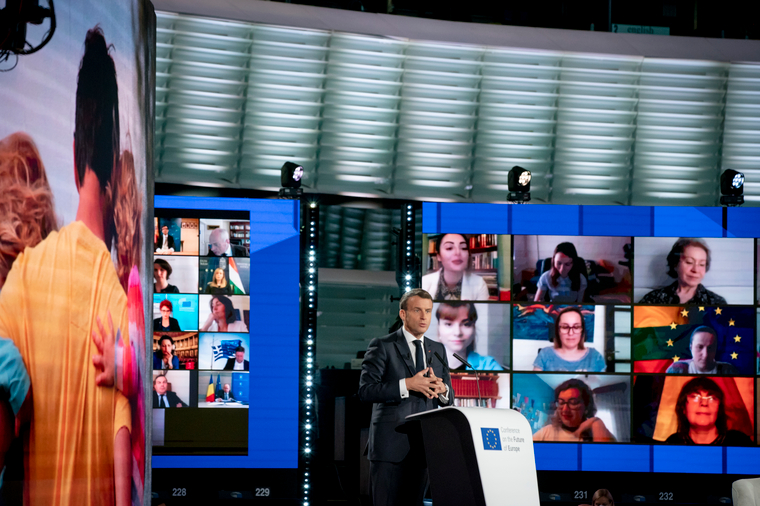
A Europe of social equity
Reform of posted work
“Europe currently has no protection from social dumping, and we have allowed a European market to develop that runs contrary to our labour market’s very philosophy of unity.”
Since 2017:
- Review of posted work and introduction of the “equal work, equal pay” principle across the European Union.
- Creation of the European Labour Authority.
Europe-wide minimum wage
“We should establish a minimum wage that takes into account the economic realities of each country. ”
Since 2017:
- Adoption under the French Presidency of the Council of the European Union of unprecedented legislation on minimum wages in Europe, which sets out shared principles and criteria to establish a decent minimum wage in each Member State.
Gender equality
- Introduction of quotas on European corporate boards of administration, following the opening of discussions under the French Presidency.
- Adoption of pay transparency measures in companies with over 50 employees.
Adoption of broad social goals by 2030
- Proclamation in November 2017 of the European Pillar of Social Rights at the Gothenburg Summit, which sets out 20 principles guiding social Europe, organized around access to work, healthy and fair working conditions and social inclusion.
- At the Porto Social Summit in May 2021, with a view to the implementation of the European Pillar of Social Rights, the Member States and European institutions pledged that by 2030, at least 78% of people aged 20 to 64 would be in employment, that 60% of adults would participate in training, and that the number of people at risk of poverty or exclusion would be reduced by at least 15 million, including 5 million children.
- Participants at the Val Duchesse Social Partners’ Summit in January 2024 made new pledges, including to tackle labour and skills shortages in the European Union (the Commission published an action plan in March 2024) and to create a dedicated European Social Dialogue Envoy.
- Adoption of a directive to protect digital platform workers and to improve their working conditions, without challenging national protection models through collective bargaining.
A Europe of culture and education
Universities
“We should establish a minimum wage that takes into account the economic realities of each country. ”
Since 2017:
- 50 European universities that bring together 430 higher education institutions located in 35 countries have already been created since 2019.
- 50 French school are involved.
Erasmus
“In 2024, half of students in a given age group should have spent at least six months in another European country by the time they are 25. whether they are university students or learning a trade. ”
Since 2017:
- Doubling of European budget for Erasmus.
- Launch of the ALMA programme for young people without degrees, without a job and without training, who are not eligible for Erasmus.
- Under Erasmus+, launch and expansion of DiscoverEU, which has enabled more than 200,000 young people to discover Europe through travel.
- Reinforcement of young people’s mobility while working on the largest synergies between national volunteer programmes (included in the Youth section of the ERASMUS+ 2023 work programme).
- Adoption of a national “apprenticeship Erasmus” act that facilitates the conclusion of apprenticeship abroad agreements and guarantees apprentices abroad a financial base for their social protection.
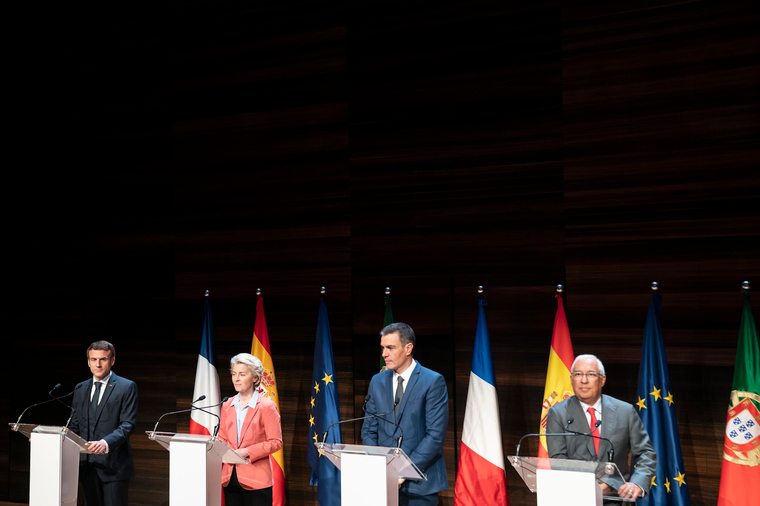
A democratic Europe
Citizens’ panels via the Conference on the Future of Europe
“By the end of the year, with representatives of European institutions and States, let’s hold a Conference for Europe where we can put forward all the changes needed for our political project, without taboos. ”
- Organization of a Conference on the Future of Europe, following contributions from 5 million visitors on the online platform and 700,000 Europeans having taken part in the Town Hall meetings held in each region of the European Union. The European Commission’s final report contains 49 objectives translated into 326 measures. Since that time, each institution has had the duty to implement the final proposals of the Conference in the context of its jurisdiction and in compliance with the treaties.
Protecting the rule of law
“What will this Europe of 2024 look like? As I have said, Europe’s unity is the basis of this overhaul. The European Union in 2024 will be brought together on two pillars, in my view. The first represents the values of democracy and the rule of law. They’re non-negotiable, there can be no cherry-picking. On values, there can be no two-speed Europe. They are the catalyst for our unity and freedom.”
- Since summer 2020, publication of an annual report on the rule of law co-drafted by the European Commission, Member States and civil society. The report gives a comparative overview of all the Member States and included specific recommendations for the first time in 2022.
- Activations of Article 7 of the Treaty on European Union, in the case of Poland (December 2017), and Hungary (September 2018), following which the Council was regularly consulted regarding the evolution of the situation in these Member States.
- Adoption of the regulation on a general regime of conditionality for the protection of the budget on 16 December 2020 making it possible to freeze European funds in the event of breaches of the rule of law that risk affecting these funds; first engagement of the procedure in April 2022 and freezing of a portion of the Hungarian cohesion funds in December 2022.
- Adoption of first steps to establish conditions for disbursing recovery plans under Next Generation EU. In the case of Poland and Hungary, these first steps more specifically concern the need to conduct reforms establishing conditions for an impartial and independent justice system.
Europe Speech, 25 April 2024.
Discover all the publications of the dossier
-
24 April 2024 Europe speech.
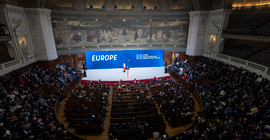
-
16 October 2020 Joint Statement on the increase of the EU’s 2030 Climate Target.

-
21 July 2020 The agreement reached at the European Council is unprecedented. On French TV channel TF1, Emmanuel Macron discusses the issues of the agreement and its impact for France.
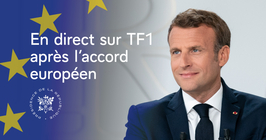
-
21 July 2020 A historic day for Europe!
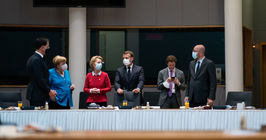
-
18 May 2020 French-German Initiative for the European Recovery from the Coronavirus Crisis

-
27 December 2019 3rd step in the initiative for Europe
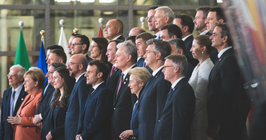
-
28 May 2019 A new order for Europe
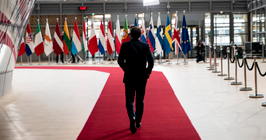
-
4 March 2019 For European renewal
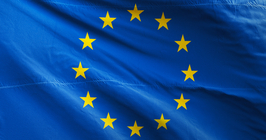
-
28 September 2018 The Sorbonne initiative: one year on
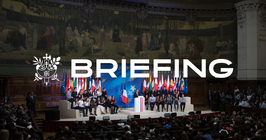
-
19 June 2018 Meseberg Declaration - Renewing Europe’s promises of security and prosperity
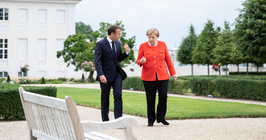
-
26 September 2017 President Macron gives speech on new initiative for Europe
